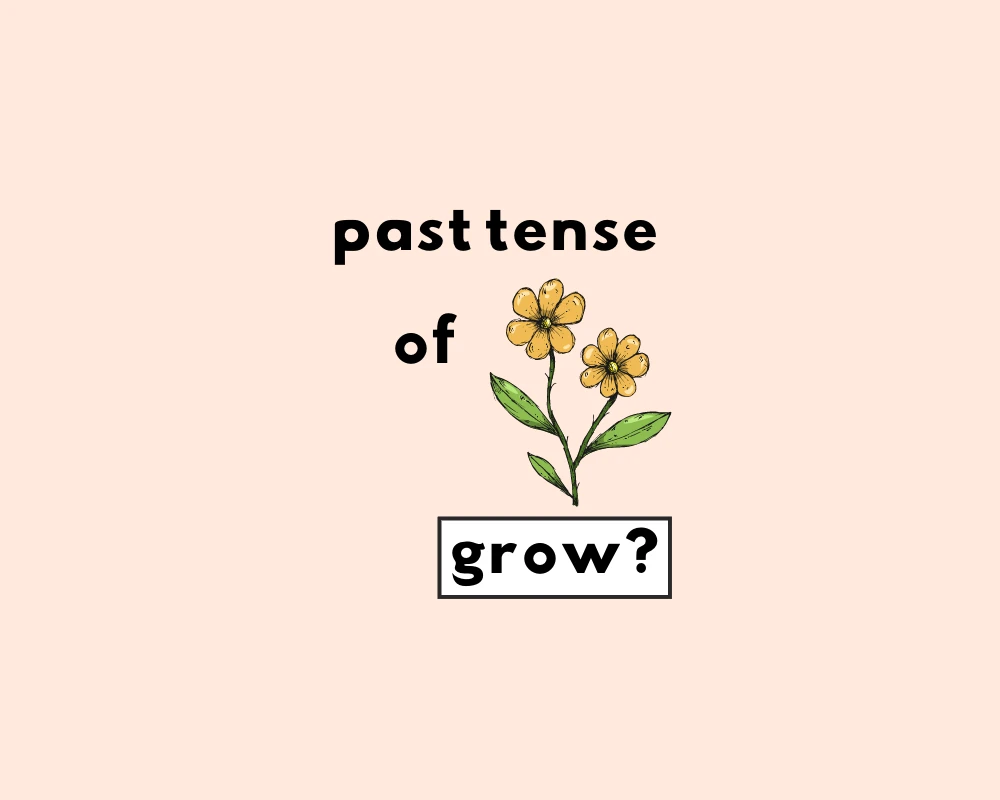
What’s the past tense of grow: grew or grown?
Which is it: grew or grown? What’s the correct past tense of the (present tense verb) grow? To keep it simple, grow is one of those irregular verbs with 3 verb forms. All this means is that the verb grow changes between the present tense, past tense and its past participle form.
The sapling grew quickly in the spring sunshine.
The children have grown so much since the last time I saw them.
My uncle has grew a beard over the winter.
The flowers grown beautifully last summer.
Since ‘grow‘ is grammatically an ‘irregular verb’ (it does not end in –ed in either of its past forms), the word grow is grouped with other, similarly irregular verbs that likewise have two past tense conjugations:
| base verb | past tense | past participle |
| grow | grew | grown |
| give | gave | given |
| begin | began | begun |
| sing | sang | sung |
| draw | drew | drawn |
| ring | rang | rung |
| drink | drank | drunk |
The meaning of “grow”
The verb and word, grow, defined by the Oxford Learner’s dictionary, is understood as, “to increase in size, number, strength or quality.” Another understanding (defined by Merriam-Webster’s, grow) is ‘to spring up and develop to maturity’. An example of the word in conversation could be, ‘You’ve grown (past participle) so much since the last time I saw you!’
1. To grow is in the present tense: The puppies grow quickly during the first six months.
2. Grew is the simple past: Her media empire grew from quite small beginnings.
3. Growing is the present participle: She is growing in confidence all the time.
4. Grown is the past participle form of the verb: You’ve grown since the last time I saw you!
When to use “grew” vs. “grown”
| simple past | The company profits grew by 5 per cent last year. |
| present perfect | Nick‘s grown almost an inch in the last month. |
The sentence in the present perfect uses an apostrophe ‘s after Nick’s name. We use apostrophes to show a possessive, but we also use them to form a contraction; i.e., a shortened form of Nick has.
We would not say ‘Nick grown almost an inch…’ because it misses the auxiliary verb to complement the participle ‘grown‘ in the sentence. Conversely, if we were to exchange the participle grown with the past tense grew, the sentence would be correct: Nick grew almost an inch in the last month.
So, we use the participle form of grow (“grown”) with auxiliaries, like had/have (to create perfect and continuous tenses in grammar). Simple tense constructions, on the other hand, do not use auxiliary verbs to denote an action or event’s relation to time.
Sentences with “grow” (present simple)
That number will grow to two billion users in 2025. (future tense)
She is growing in confidence all the time. (present participle)
Well before a billionth of a second had elapsed the universe started to grow exponentially.
The puppies grow quickly during the first six months.
Newborns grow quickly so cherish that phase of life.
Sentence examples with “grew” (past tense)
Her media empire grew from quite small beginnings.
The company profits grew by 5 per cent last year.
The cut edges of the wound grew together
The project grew out of a mere suggestion
She grew pale at the devastating news.
‘Grew’ is the simple past; ‘grown’ is the past participle, typically used with ‘have’ or ‘has’.
Sentences with “grown” (past participle)
The city’s population has grown from about 50 000 to over a million in 20 years.
The family has grown in size recently.
The Chinese economy has grown at a record pace.
You’ve grown since the last time I saw you!
Nick’s grown almost an inch in the last month.
Synonyms of the word grow
- age
- advance
- cultivate
- develop
- mature
Origin of the word grow
From etymology online on grow (v.):
Old English growan (of plants) “to flourish, increase, develop, get bigger” from Proto-Germanic gro- from PIE root ghre- “to grow, become green”.
Other commonly confused verb tenses
- What’s the past tense of spread?
- What’s the past tense of lead?
- What’s the past tense of choose?
- What’s the past tense of fly?
- What’s the past tense of lay?
- What’s the past tense of drive?
- What’s the past tense of draw?
Learn more about verbs
- What are regular and irregular verbs?
- Transitive and intransitive verbs?
- What are verbs?
- What’re personal pronouns?
- What’s the difference between they’re, their, and there?
- Whose vs who’s?
Work Sheet
What is the simple past tense form of the verb “grow”?
Which form of the verb “grow” is considered the past participle?
According to the blog post, when is the form “grown” typically used?
Which sentence from the post correctly uses the simple past tense form of “grow”?
Which type of verb is “grow” because its past forms do not end in “-ed”?
Her media empire from quite small beginnings.
You’ve so much since the last time I saw you!
Nick ‘s almost an inch in the last month. (Note: ‘s is a contraction for has)
The company profits by 5 per cent last year.
My uncle has a beard over the winter.
Frequently Asked Questions
What is grow’s simple past tense?
+
What are the 3 forms of grow?
+
When do I use “grew”?
+
When do I use “grown”?
+
Why is “has grew” wrong?
+
Yash, D. "What’s the Past Tense of Grow? Grew or Grown?." Grammarflex, Jun 20, 2025, https://www.grammarflex.com/is-it-grew-or-grown-whats-the-correct-past-tense-of-grow/.
Sources
-
Harper, Douglas. “Etymology of grow.” Online Etymology Dictionary, https://www.etymonline.com/word/sew. Accessed 6 March, 2023.











